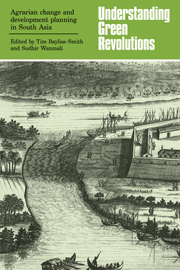Book contents
- Frontmatter
- Contents
- List of contributors
- Preface
- I Understanding Green Revolutions: an overview
- II Agrarian change at village level
- III Development planning and agrarian change
- 12 Rural-based models for rural development: the Indian experience
- 13 Planning and agrarian change in East Africa: appropriate and inappropriate models for land settlement schemes
- 14 Metropolitan expansion in India: spatial dynamics and rural transformation
- 15 Green Revolution and water demand: irrigation and ground water in Sri Lanka and Tamil Nadu
- 16 Social organisation and irrigation: ideology, planning and practice in Sri Lanka's settlement schemes
- 17 Environmental hazard and coastal reclamation: problems and prospects in Bangladesh
- 18 Beyond the Green Revolution: a selective essay
- Index
16 - Social organisation and irrigation: ideology, planning and practice in Sri Lanka's settlement schemes
Published online by Cambridge University Press: 25 May 2010
- Frontmatter
- Contents
- List of contributors
- Preface
- I Understanding Green Revolutions: an overview
- II Agrarian change at village level
- III Development planning and agrarian change
- 12 Rural-based models for rural development: the Indian experience
- 13 Planning and agrarian change in East Africa: appropriate and inappropriate models for land settlement schemes
- 14 Metropolitan expansion in India: spatial dynamics and rural transformation
- 15 Green Revolution and water demand: irrigation and ground water in Sri Lanka and Tamil Nadu
- 16 Social organisation and irrigation: ideology, planning and practice in Sri Lanka's settlement schemes
- 17 Environmental hazard and coastal reclamation: problems and prospects in Bangladesh
- 18 Beyond the Green Revolution: a selective essay
- Index
Summary
Benny Farmer's book Pioneer Peasant Colonisation in Ceylon (1957) is a classic of agrarian studies; and its synthesis of environmental, economic and social analyses in explaining the pattern of development that has taken place in the settlement schemes of Sri Lanka's Dry Zone, represents an instance of the holism of the geographical tradition at its best. This study is intended as a small tribute to that book, which – though Farmer himself modestly describes it as ‘widely quoted and little read’ – comes to conclusions which are still of relevance today, while many of its practical recommendations have come gradually to be implemented.
This study is based on short periods of fieldwork in four of the older Dry Zone settlements, in the ‘H’ area of the new Mahaweli Project, and on Uda Walawe, all carried out in 1978, as well as on my earlier research in Hambantota District in 1974, which formed part of the Cambridge ‘Green Revolution’ Project that B.H. Farmer directed. The concern about water management which the essay reflects is one that Farmer himself identified in ‘Pioneer Peasants’ when he wrote: ‘One of the most urgent tasks if Ceylon's water resources are to be used to best advantage is to arrive at more economical use of irrigation water.’ This advice was largely ignored, however, until the recent past. Robert Chambers’ work, in particular, in the ‘Green Revolution’ Project, contributed much to increasing awareness of the importance of water management issues in official circles in Sri Lanka, and in development agencies.
- Type
- Chapter
- Information
- Understanding Green RevolutionsAgrarian Change and Development Planning in South Asia, pp. 315 - 338Publisher: Cambridge University PressPrint publication year: 1984
- 1
- Cited by



